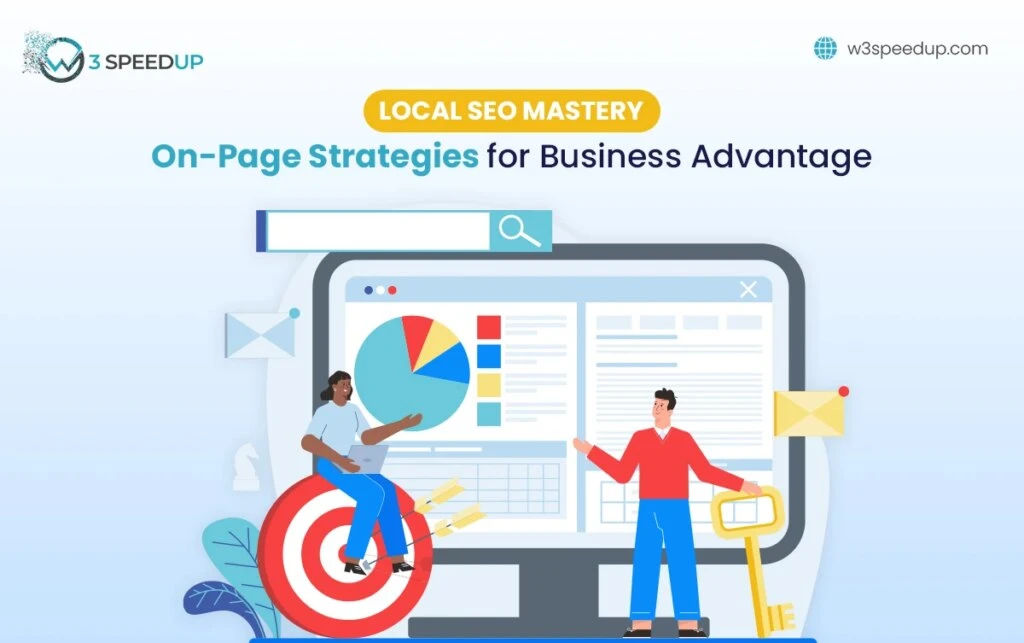Your website is more than just an online presence—it’s the cornerstone of your business. It’s where customers discover your offerings, learn about your brand, and decide whether to engage with you.
However, simply having a website isn’t enough; it needs to be seen by the right audience. That’s where search engine optimization (SEO) comes into play. Effective SEO is vital for ensuring your business stands out, especially in a competitive local market.
According to Google, 88% of people who perform a local search visit a business within the first week, and a staggering 76% do so on the same day. To rank high in Google’s local search results, your website content must be optimized.
Fortunately, by leveraging competitive local SEO tactics, you can enhance your visibility and drive more traffic to your business. That said, let’s dig deeper!
Why Partnering with an Expert Makes a Difference
Navigating on-page optimization can be challenging, especially for those unfamiliar with the process. Many small businesses struggle with finding the right keywords, optimizing content, and staying updated with changes in Google ranking factors. This is where partnering with an expert becomes valuable.
Professionals specializing in local SEO for small businesses bring expertise in the latest techniques, saving you time and effort. Their specialized knowledge allows them to achieve better results, helping your business rank higher and attract more customers.
While concerns about cost or trustworthiness might arise, the long-term benefits often outweigh these worries. A reliable professional can tailor their services to fit your budget and needs, ensuring you get the best return on your investment by improving your local business ranking.
Essential On-Page SEO Techniques to Implement
To enhance your website’s local visibility, it’s crucial to focus on a few key on-page optimization techniques. These local SEO optimization strategies will help improve your search rankings and attract more local customers.
1. Optimizing Meta Titles and Descriptions
Meta titles and descriptions are vital for grabbing attention in search results. Including local SEO ranking factors in your titles helps search engines understand your business location, improving your chances of ranking higher. For example, instead of just using “Best Coffee Shop,” you could use “Best Coffee Shop in [Your City].”
When writing meta descriptions, aim to make them compelling and informative. A strong call to action, such as “Visit us today in [Your City] for the best coffee experience,” can entice users to click. Keep these descriptions concise and relevant to increase click-through rates.
2. Content Optimization for Local Audiences
Creating high-quality, relevant content is key to engaging local users. Your content should address the needs and interests of your community. Incorporate local SEO strategies naturally, such as mentioning your city or neighborhood in the text. For example, instead of just “We offer plumbing services,” try “We offer plumbing services in [Your City].”
Nevertheless, using keywords effectively without overstuffing is important. Spread them evenly throughout your content, including in headings and subheadings. Additionally, consider adding local information like landmarks, neighborhoods, and community-related content. This not only helps with search rankings but also makes your content more relatable to local customers.
3. URL Structure and Internal Linking
Your website’s URL structure should be clean and straightforward. Use simple, descriptive URLs that include local keywords. For example, “yourwebsite.com/[city]-plumbing-services” is better than “yourwebsite.com/services123.”
Internal linking is another powerful tool. By linking to other relevant pages within your site, you can guide users to more information and keep them engaged longer. This improves user experience and helps search engines understand the importance of different pages on your site, boosting your rankings.
4. Image Optimization
Using relevant images on your website enhances user engagement, but it’s important to optimize them for local search. Include local keywords in the alt text of your images, like “Coffee shop in [Your City].” This helps search engines index your images and boosts your site’s visibility.
Fast-loading images are also crucial. Large, slow-loading images can hurt your site’s performance and rankings. Compress images to reduce their size without sacrificing quality, ensuring a smooth and fast user experience. This is especially important for mobile users, who make up a large portion of local searches.
Leveraging Online Tools for Continuous Improvement
Using online tools can make it easier to track and improve your website’s performance. Tools like Google Search Console and Yoast can help you monitor how well your pages are doing. They show you which keywords are working and where you can make improvements.
These tools also give you suggestions for fixing issues that might be hurting your site’s rankings. Analytics play a big role in refining your strategies. By looking at data, you can see what’s working and what’s not. This allows you to improve your approach, focusing on what brings the best results and continuously improving your site’s performance.
Conclusion
On-page optimization is vital for local business success, helping you attract more customers and stand out in your area. If you want a competitive edge, consider seeking professional help. With their help, start applying these strategies. You’ll likely see improved rankings and increased traffic to your website. Don’t wait—take action now to boost your local presence.
 Christmas Mega Sale – Enjoy Up to 50% OFF on Every Plan!
Christmas Mega Sale – Enjoy Up to 50% OFF on Every Plan! 



